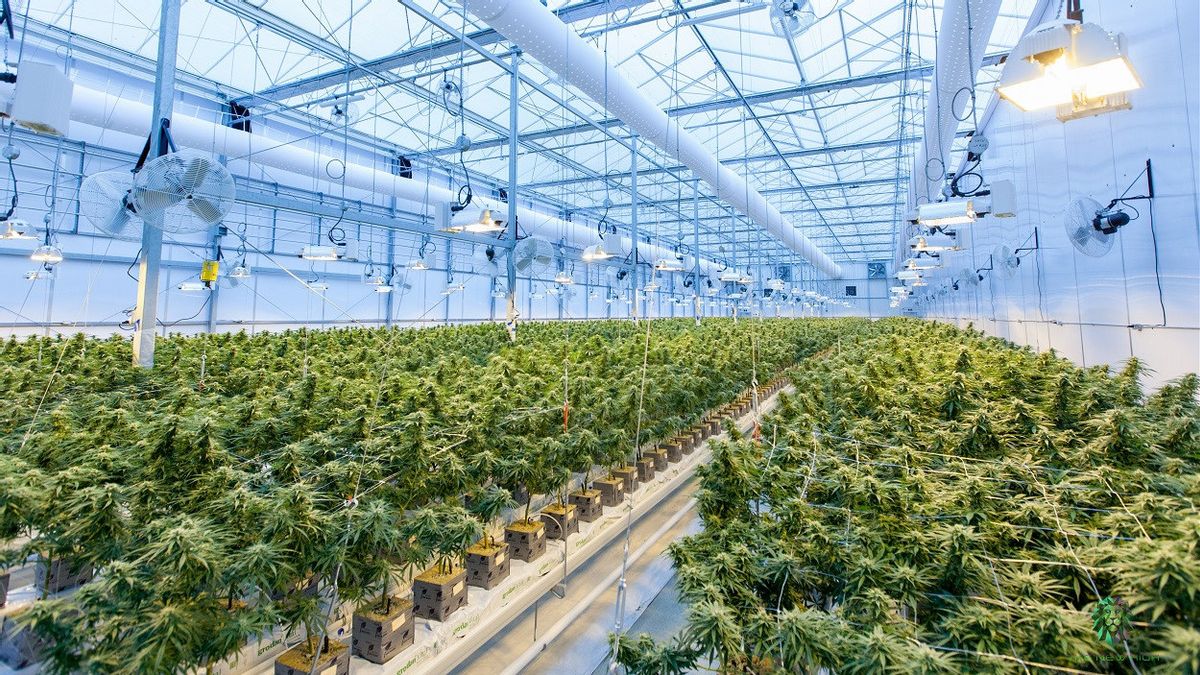JAKARTA - The former slaughterhouse in Dresden, Germany is now home to rows of cannabis plants. They are planted in November, with the first harvest due in January which will mark the first large-scale legal cannabis harvest on German soil.
The leaves will be turned into cannabis powder and used in legal medical marijuana products. The company behind the plantation is called Demecan.
The Berlin-based company is one of three to win a tender from a German cannabis agency to produce cannabis in the country. Two other companies are still working on their production.
"This is actually something very new. It is a unique facility that we have here in Germany. The only German facility for cultivating medicinal cannabis," said Constantin von der Groeben, managing director of Demeca, citing Euronews Jan. 4.
"And what we see here is the first batch of medicinal cannabis that we are currently growing. This facility then, next year, will produce one tonne of dry cannabis flour. So, one thousand kilograms," he explained.

Medical marijuana products were legalized by the Federal Government in Germany in 2016. However, the new government under Chancellor Olaf Scholz, who came to power last December, wants to go a step further and legalize the sale of marijuana for recreational use to adults in specialty and licensed shops. .
This will be similar to the existing laws in Canada and some US states. In Berlin, several cannabis-focused start-ups have been founded over the last few years.
One of them is the Sanity Group which specializes in medical cannabis products as well as personal care products containing CBD cannabis oil, which is extracted from the cannabis plant.
Fabian Friede, co-founder of the Sanity Group, welcomed the move towards legalization.
"So I think overall, on a macro level, the direction is in the right direction. I think moving towards recreational marijuana use is great. Also, reducing the prescription of medicinal marijuana is great."
"But as you've said, it's all about the details. And because of that, I think we were very curious, and the waiting time was the most difficult because we wanted to start preparing and of course, we did. Prepared every direction, because we I don't know exactly where it's going," he explained.
The new German government consists of three parties in the coalition: the Social Democrats, the Greens and the Free Liberal Democrats.
Before the parties began co-ruling, they agreed a coalition contract of more than 170 pages, by which the steps toward legalizing marijuana for recreational use were set out.
The document stipulates that licensed shops will be allowed to sell marijuana to adults, but other than that there are not many details.

There is also no definite timeline, but since the government has a four-year mandate, it is implied that this is the longest timeframe.
"There will be more start-ups. There will be more companies. There will be entire industries, one sector is around. From regulation, from shipping to pharmacies, to logistics," said Sanity Group pharmaceutical company co-founder Finn Hänsel.
"So, I think it's going to be really booming, creating more jobs, creating more tax revenue for the government. So, I actually think, even though it's definitely going to be competition for us, I think it's great for the market. And to be honest, there is nothing better than healthy competition," he explained.
However, there has been some criticism of the plan, particularly from among the Christian democratic CDU Party which ruled Germany for 16 years under Angela Merkel.
There are concerns that younger people will have easier access to marijuana than older friends and relatives, and there are those who say it won't reduce crime, but criminal gangs will switch to other drugs or sell marijuana cheaper than stores.
Friede said those concerns needed to be addressed in the final legislation.
"Yes, I understand there are risks involved with it. I mean, if we look at the use of marijuana for minors and all, then of course, we need to talk about it in detail," he said.
"We need to address this risk. But I don't think doing anything is also not a solution. Because people are using marijuana, they are just using it in lower quality, coming from the black market, supporting organized crime. How is that better? than the alternative?" " continued Friede.
The argument that organized crime will have one less market and the state will in turn have one more avenue, for tax revenues is often raised in debates over the legalization of cannabis in Germany. But one of the country's two main police unions is skeptical.
"The police's view is, we add other drugs to drugs that are already legal, such as nicotine and alcohol, and that we may get other 'drugs' that are widely used in the form of marijuana," said Jörg Radek, vice president of the German Police Union GdP.
"And as a police officer, I have my doubts about this because it will change society. But also, for us in the police force, we will definitely get more jobs."
The English, Chinese, Japanese, Arabic, and French versions are automatically generated by the AI. So there may still be inaccuracies in translating, please always see Indonesian as our main language. (system supported by DigitalSiber.id)













